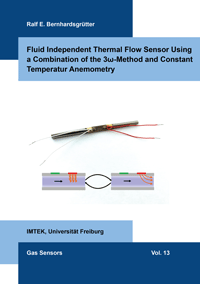
Shop : Details
Shop
Details
48,80 €ISBN 978-3-8440-8847-2Softcover184 pages112 figures273 g24 x 17 cmEnglishThesis
December 2022
Ralf Emanuel Bernhardsgrütter
Fluid Independent Thermal Flow Sensor Using a Combination of the 3ω-Method and Constant Temperatur Anemometry
Thermal flow sensor principles have been known for over 100 years. The micro-machined flow sensors are widely used due to their simple measurement principle, their flexibility regarding application and their cost-efficiency. But still, the thermal sensors are highly fluid-dependent since the signal of thermal flow sensors does not only depend on the flow rate, but also on the thermal parameters of the fluid.
This work presents a new approach to compensate for the fluid dependence of such a thermal sensor in the case of liquids, aiming for a fluid-independent thermal sensor. The investigated thermal flow sensor is based on the anemometric principle, which is dependent on the flow velocity, but also on the thermal parameters of the fluid. The proposed approach contains two thermal measurement principles, namely the 3ω-method and the constant temperature anemometry to measure the flow velocity independently of the liquid. The idea is a two-step method. In the first step, the 3ω-method is performed to characterize the fluid. In the second step, constant temperature anemometry is used to characterize the convection. Using the information of the fluid and the flow characterization, the flow velocity can be determined independently of the liquid.
The method was tested both theoretically and experimentally for different liquids. The liquid characterization done by the 3ω-method can be executed at no-flow or flow condition. Depending on the flow condition during the 3ω-method, the accuracy of the flow velocity found in the experiment was 5% and 10% for the investigated liquids, respectively. Therefore, the proposed compensation method reduces the fluid dependence of a thermal flow sensor. Further work on this method may lead to a fluid-independent thermal flow sensor.
This work presents a new approach to compensate for the fluid dependence of such a thermal sensor in the case of liquids, aiming for a fluid-independent thermal sensor. The investigated thermal flow sensor is based on the anemometric principle, which is dependent on the flow velocity, but also on the thermal parameters of the fluid. The proposed approach contains two thermal measurement principles, namely the 3ω-method and the constant temperature anemometry to measure the flow velocity independently of the liquid. The idea is a two-step method. In the first step, the 3ω-method is performed to characterize the fluid. In the second step, constant temperature anemometry is used to characterize the convection. Using the information of the fluid and the flow characterization, the flow velocity can be determined independently of the liquid.
The method was tested both theoretically and experimentally for different liquids. The liquid characterization done by the 3ω-method can be executed at no-flow or flow condition. Depending on the flow condition during the 3ω-method, the accuracy of the flow velocity found in the experiment was 5% and 10% for the investigated liquids, respectively. Therefore, the proposed compensation method reduces the fluid dependence of a thermal flow sensor. Further work on this method may lead to a fluid-independent thermal flow sensor.
Keywords: flow sensing; fluid compensation; 3ω-method; constant temperature anemometry; platinum thin film
Available online documents for this title
You need Adobe Reader, to view these files. Here you will find a little help and information for downloading the PDF files.
Please note that the online documents cannot be printed or edited.
Please also see further information at: Help and Information.
Please also see further information at: Help and Information.
| Document |  | Document | ||
| Type |  | |||
| Costs |  | 36,60 € | ||
| Action |  | Purchase in obligation and download the file | ||
| Document |  | Table of contents | ||
| Type |  | |||
| Costs |  | free | ||
| Action |  | Download the file | ||
User settings for registered online customers (online documents)
You can change your address details here and access documents you have already ordered.
User
Not logged in
Export of bibliographic data
Shaker Verlag GmbH
Am Langen Graben 15a
52353 Düren
Germany
Am Langen Graben 15a
52353 Düren
Germany
Mon. - Thurs. 8:00 a.m. to 4:00 p.m.
Fri. 8:00 a.m. to 3:00 p.m.
Fri. 8:00 a.m. to 3:00 p.m.
Contact us. We will be happy to help you.



